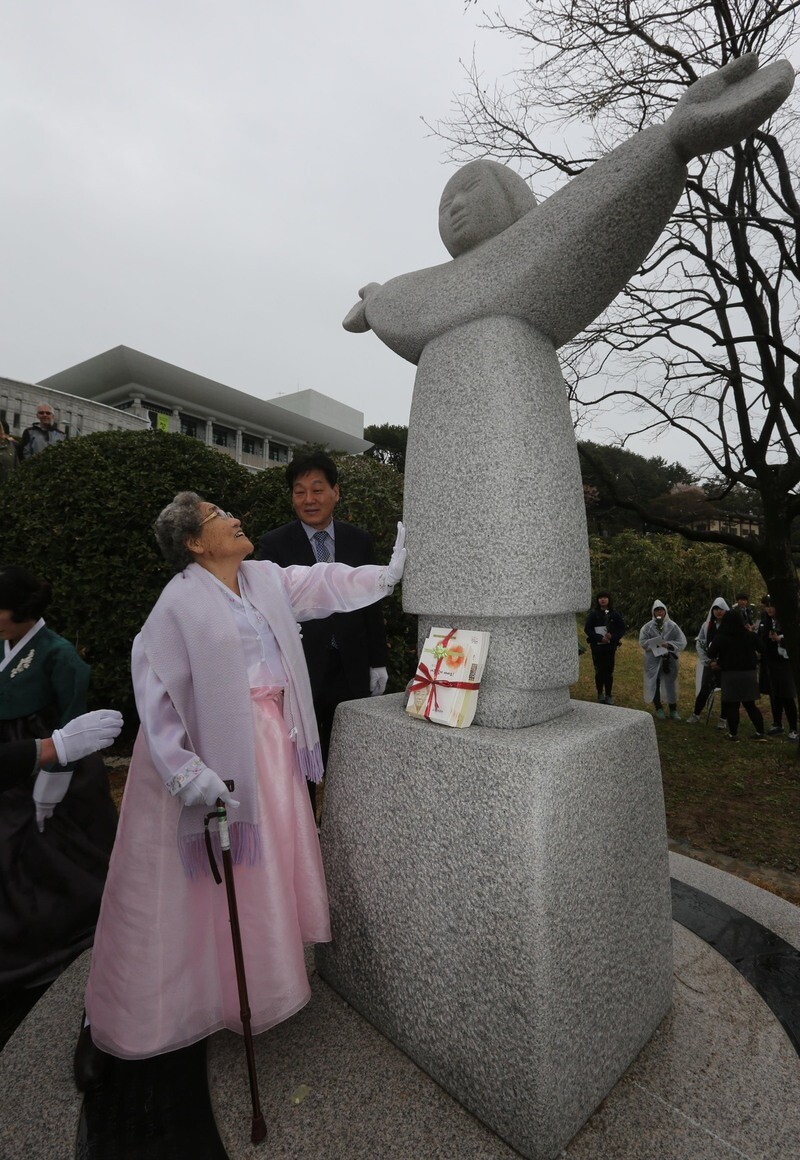hankyoreh
Links to other country sites 다른 나라 사이트 링크
Another comfort woman survivor passes away without apology from Japan

Another comfort woman survivor forced into sexual slavery for the Japanese military has passed away without ever receiving an official apology from the Japanese government. The number of remaining survivors now stands at 27.
Tongyeong Sanatorium Hospital in South Gyeongsang Province announced the passing of 101-year-old comfort woman survivor Kim Bok-deuk in her hospital room from chronic illness at around 4 am on July 1. Kim was admitted into the hospital in 2013 after her health declined to the point where she was unable to live on her own at home.
Kim was born in Tongyeong, South Gyeongsang, in 1918. As a 21-year-old in 1939, she was on her way to her aunt’s home in Geoje when she was misled by a conscription recruiter, who told her that she could have a job at a factory. She boarded a boat to the Chinese city of Dalian, where she was then taken to the Philippines and forced to become a comfort woman for the Japanese military. After enduring numerous hardships, she finally returned home following Korea’s liberation in 1945.
Kim would never marry, spending the rest of her life bearing the suffering in her heart. In 1994, she traveled to various places in South Korea and the Japanese cities of Nagoya and Osaka for demonstrations denouncing Japan in an effort to raise Seoul’s awareness of her status as a comfort woman survivor and gain official apology from Tokyo. She also gave accounts of the comfort women system and comfort stations operated by the Japanese military.
She also gave back to society from the savings she scraped together selling fish at a market. In 2012, she provided scholarship funds to Tongyeong Girls’ High School; in 2013, she contributed 20 million won (US$17,900) in funds to build a comfort woman history museum in South Gyeongsang Province. The South Gyeongsang Office of Education also compiled Kim’s story into the 2013 book “Don’t Forget Me” for use as a history textbook. That same year, the Justice Monument – a statue of a young girl symbolizing Kim – was raised in Tongyeong’s Nammangsan Park.
After years of dedicated work for society, Kim was admitted to Tongyeong Sanatorium Hospital in the fall of 2013. Her physical strength had weakened to the point she had difficulty standing on her own. Even after her hospitalization, her battle to bring the truth to light continued. After the Park Geun-hye administration announced an agreement hastily reached on the Japanese military comfort women issue on Dec. 28, 2015 with a 1 billion yen (US$9 million) contribution from the Japanese government, Kim added her name to the list of plaintiffs in a 2016 case filed by the Korean Council for the Women Drafted for Military Sexual Slavery by Japan (Jeongdaehyeop) to demand damages.
Kim also found herself at the center of a controversy in Jan. 2017 when a payment of 100 million won (US$89,500) was made to her by the Reconciliation and Healing Foundation, an organization established in July 2016 after the South Korean and Japanese governments’ Dec. 28 agreement. Kim claimed she had been “unaware” of the payment and announced her plans to return it through her niece, who was serving as her guardian. Her family members have claimed that the foundation had “yet to accept the returned 100 million.”
Kim’s wake has been organized at the Tongyeong Sanatorium Hospital funeral home. Her coffin is scheduled to be carried out on July 3. The group Tongyeong and Gojeo Residents Working with the Japanese Military Comfort Women plan to establish a memorial at Tongyeong Indoor Gymnasium.
Kim’s death brings the number of comfort women survivors who have passed away this year to five. Kim’s niece, also surnamed Kim, said her aunt “was adamant about wanting an apology from the Japanese government during her lifetime.”
By Kim Kwang-soo, Busan correspondent
Please direct comments or questions to [english@hani.co.kr]

Editorial・opinion
![[Editorial] Penalties for airing allegations against Korea’s first lady endanger free press [Editorial] Penalties for airing allegations against Korea’s first lady endanger free press](https://flexible.img.hani.co.kr/flexible/normal/500/300/imgdb/original/2024/0502/1817146398095106.jpg) [Editorial] Penalties for airing allegations against Korea’s first lady endanger free press
[Editorial] Penalties for airing allegations against Korea’s first lady endanger free press![[Editorial] Yoon must halt procurement of SM-3 interceptor missiles [Editorial] Yoon must halt procurement of SM-3 interceptor missiles](https://flexible.img.hani.co.kr/flexible/normal/500/300/imgdb/child/2024/0501/17145495551605_1717145495195344.jpg) [Editorial] Yoon must halt procurement of SM-3 interceptor missiles
[Editorial] Yoon must halt procurement of SM-3 interceptor missiles- [Guest essay] Maybe Korea’s rapid population decline is an opportunity, not a crisis
- [Column] Can Yoon steer diplomacy with Russia, China back on track?
- [Column] Season 2 of special prosecutor probe may be coming to Korea soon
- [Column] Park Geun-hye déjà vu in Yoon Suk-yeol
- [Editorial] New weight of N. Korea’s nuclear threats makes dialogue all the more urgent
- [Guest essay] The real reason Korea’s new right wants to dub Rhee a founding father
- [Column] ‘Choson’: Is it time we start referring to N. Korea in its own terms?
- [Editorial] Japan’s rewriting of history with Korea has gone too far
Most viewed articles
- 160% of young Koreans see no need to have kids after marriage
- 2Presidential office warns of veto in response to opposition passing special counsel probe act
- 3Months and months of overdue wages are pushing migrant workers in Korea into debt
- 4[Editorial] Penalties for airing allegations against Korea’s first lady endanger free press
- 5Hybe-Ador dispute shines light on pervasive issues behind K-pop’s tidy facade
- 6Japan says it’s not pressuring Naver to sell Line, but Korean insiders say otherwise
- 7S. Korea “monitoring developments” after report of secret Chinese police station in Seoul
- 8[Column] Unsettling moves by the UN Command lay way for Korean involvement in Taiwan
- 9[Reporter’s notebook] In Min’s world, she’s the artist — and NewJeans is her art
- 10[Column] Park Geun-hye déjà vu in Yoon Suk-yeol